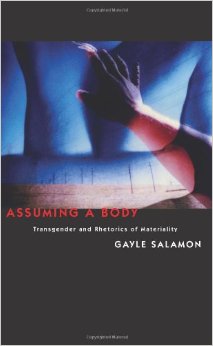About
From science to feminism, from queer theory to ethnography, from interrogations of masculinity to ethics; transgender studies zigzags across the academy. The question ‘Where can transgender studies go?’ has been generously answered with over two decades of scholarship. ‘How does it get there?’ and ‘What does it want to do?’ are remaining methodological questions that I suggest be reflected on by heuristically bracketing the field into two kinds of disciplinary interaction. Much research demonstrates the ways in which transgender issues are transdisciplinary and ‘trans-sect’ the academy, cutting through and interrupting previously held ideas that are hostile to or even foreclose transgender lives, practices, and subjectivity. Other research displays interdisciplinary interest in drawing on and often extending modes of established cultural, social, and political critique as well as displaying conceptual alliance with other fields. Gayle Salamon’s recently published dissertation in the book Assuming a Body: Transgender and the Rhetorics of Materiality is a fine example of scholarship that successfully accomplishes both kinds of disciplinary interaction in its interrogation of the ‘body concept’.
